
When President Kennedy was shot, it was a clear fracture in recorded human history. Everyone remembered that moment; where they were, who they were with, what they were thinking and feeling. There had never been an event like that before, and nobody anticipated anything would eclipse it – until nearly 38 years later.
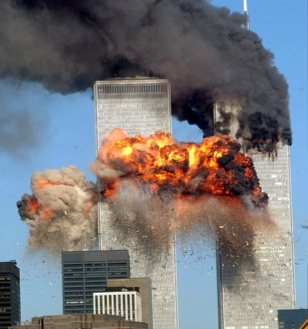
There is one critical difference between these two events; one sickening, subconscious collective thought that makes people even more uncomfortable than the grotesque pornography of the imagery associated with these tragedies – we are all responsible for 9/11. Please ignore the intentional “shock and awe” of that statement, strip away what you believe or assume to know of these events, and continue reading.
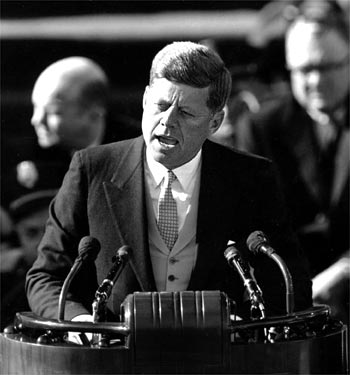
When Kennedy took office, it was a different world. Globalization and the associated instant gratification of modern life had not yet taken over. The dark clouds of slavery and two world wars had lifted, the prevailing optimism and ingenuity of the 1950’s had left Americans patriotic and proud of their way of life, and the seeds of distrust and cynicism had not yet taken hold in the populace. The violent civil rights movement, the Vietnam War, Watergate and other ensuing events were unwritten stories awaiting their place in our history.
But just 3 days before Kennedy’s inauguration, a solemn, prescient foreshadowing came in the form of Dwight D. Eisenhower’s inspiring farewell address. He cautioned against our growing dependence on the “military-industrial complex”, an addiction that we have only become more dependent on over time. However, that is only part of the picture. An even more terrifying warning came half a decade earlier, when M. King Hubbert foretold of the concept of “peak oil”, something that remains a mystery to Americans today, a half century later, despite numerous growing signs of its effects and its crucial importance to our survival. Going back further, more than a half century before Kennedy’s time, Henry Adams could see the writing on the wall.
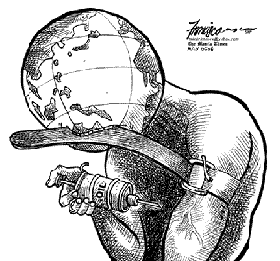
How much we choose to understand our dependence on oil in our everyday lives will directly impact our ability to evolve beyond a mere footnote in human history. When crude oil is refined, it can be transformed into a wide variety of petroleum products. The Energy Information Administration has a lovely “kids” themed page that provides a basic overview. There are also many lists of products derived from petroleum. Hell, commercial manufacturers can even feed it to you if the PPM is low enough. At least your Jell-O is green! Given its ubiquity, it’s easy to get an overwhelming feeling that oil has an inescapable death grip on our daily lives.
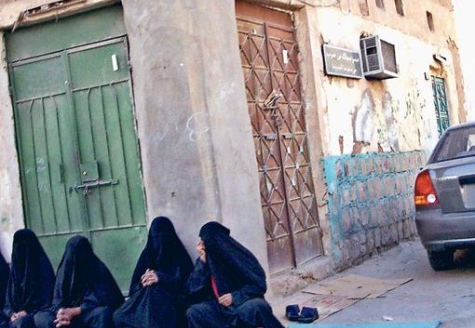
Saudi poverty is a growing economic trend. Why? With the United States shamelessly lounging in bed with OPEC, wealthy Saudis are living it up like tycoons toasting each other on the deck of the Titanic. It wasn’t until 2003 that they even acknowledged poverty as a problem in their country. And why should they even acknowledge it at all? They are still the world’s leading producer and exporter of oil, and their profits are still ballooning. There is clearly a vested interest in continuing to support an infrastructure that creates such vast wealth, despite any indication of its future decline. It’s probably why they’re spending so reasonably on defense. Now that Iraq has been “democratized“, we will likely see similar trends emerge there, as they join Saudi Arabia and Kuwait as our “friends” in the Middle East. And it’s only a matter of time before more than sanctions are required to deal with Iran. What is happening there today is a microcosm of what we can expect as global supplies of resources (not just oil) start to dwindle.
The situation is made ever more dire by specialization in the wake of globalization. Nobody knows how to do anything anymore. We’ve been trained to rely on authorities and specialists to resolve issues for us, or to simply discard and replace things when we deem it necessary. In this way, your average citizen has no idea how to recreate all the innovations of the Industrial Age. At best, one can account for only a minuscule part of the overall picture.
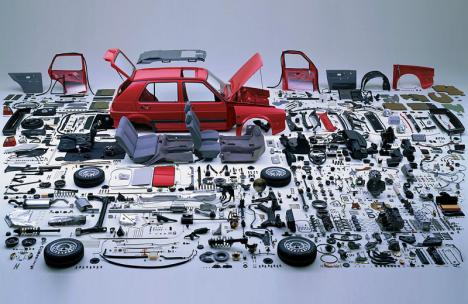
For example, when your car breaks down, you take it to be serviced. The person performing the service likely specializes in your particular type of vehicle (European import, Japanese import, etc). They’ve been trained by a person who also specializes in that particular type of vehicle (possibly in a specialized educational institution), and work in a business built around that specialization. When they need parts, they order them from a specialized vendor, who obtains parts from an approved manufacturer, who also specializes in those particular types of parts (ideally OEM – equipment directly from the vehicle’s manufacturer). Those manufacturers need raw materials – likely petrochemicals, rubber, plastics, etc. – which are supplied by refineries that specialize in extracting and processing them. Those refineries need crude oil, which is provided by a company that extracts it – often another subsidiary of a shared parent corporation.
In order to get your car back on the road, all of these players must have the knowledge, experience and materials necessary to perform their jobs. Infrastructure which completely depends on the presence of cheap, unlimited supplies of energy provided by crude oil. It would be impossible for an average person to cut out all of these middlemen, create the necessary parts from scratch and perform the service themselves.
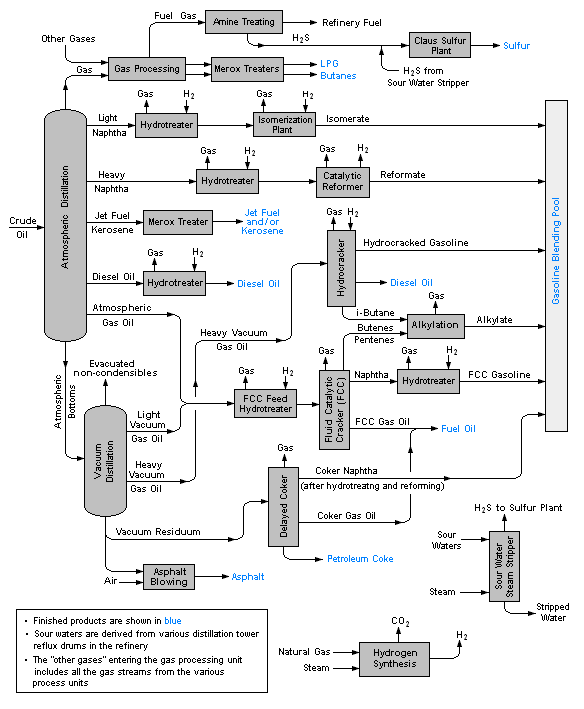
We’ve been conditioned to take for granted that all the difficult things will be taken care of so that we can simply walk into any Walmart and buy whatever we need to continue on with our day. Often, the true cost of our modern lifestyle is not paid by the consumer. People complain of high prices at Whole Foods, for example, when the reality is that people should be complaining about the low prices at Walmart. Cheap, seemingly plentiful goods provide incentive to be wasteful, especially when those low prices are deceptive. Government subsidies are provided to Walmart, the oil industry and the corn industry, leading to a vending machine mentality when it comes to our food supply. Why worry about eating well when you can buy a whole palette of ramen for $3? If those subsidies were removed and the ramen was suddenly $3 per ounce, behaviors would quickly change.
Apply this same method of thinking to the mass scales of food production, water processing, waste management, the power grid – it’s not hard to see just how little the average person could accomplish in an post-industrial scenario. In this context, it would only take a generation or two before all tasks dependent upon specialization would be seriously impaired, and likely a century (at most) before we would effectively become modern cavemen. What purpose would a periodontist serve when the world is no longer able to produce dental implants, mouthwash and so on?
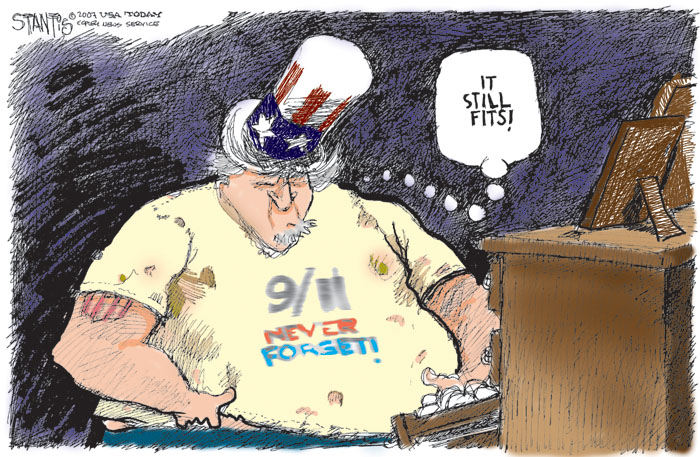
2,996 lives were extinguished on that dark September day. From that moment forward, much of the energy surrounding 9/11 has been focused on assigning blame. It’s ultimately irrelevant what you choose to believe; whether poverty-stricken Middle Eastern men were roused into committing acts of terror on behalf of religious extremists or some vast conspiracy played out on the world stage to line the pockets of corporate interests and hand over power to politicians, the fact remains that a very real, very physical blow was dealt to the heart of both the financial sector and the military-industrial complex – the very things that lie at the center of our addiction to oil and hold us back from evolving to face the challenges of tomorrow. The significance of that has been lost in the noise, and in turn, so has the message. To that end, it bears repeating that we are all responsible for 9/11.
All the energy spent being pissed at Republicans, Democrats, Sunnis, Shiites, the rich, the poor, religious zealots, atheists, governments, terrorists and everything else named as a cause or effect of 9/11 doesn’t at all detract from the individual complicity in our choice to wake up every day and participate in this modern lifestyle of consumption and comfort. Without our demand for these things, one could even argue that 9/11 may never have happened. But rather than reflect upon our roles in society, we lash out at people who aren’t directly responsible for what we’re upset about and put as much effort into problem solving as we do into voting for contestants on some meaningless reality show.
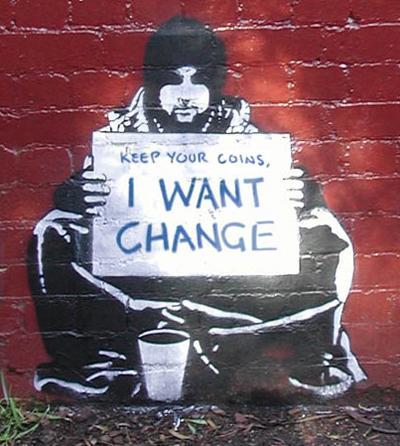
We were the land of the free and the home of the brave. Today, we have the land of the victim, home of the willfully ignorant. One nation, under-informed, with tragic consequences for all. It’s time to rewrite our Declaration of Independence, lest we all become the new cavemen. For a mass of people to refer to themselves as the “United States” while at the same time facing some of the most deep division in the history of this nation is, plain and simple, ludicrous. Unity – true unity – is not just desirable, but necessary in order to ensure any sort of meaningful future for the planet, let alone the country. If our infrastructure were to collapse, your affiliations wouldn’t matter. Your net worth would be meaningless. Your possessions would become liabilities.

It’s up to us to accept personal responsibility – ownership – for this planet and its resources, and to make well-informed, thoughtfully considered decisions on how to exist within it. We must strive to work together, else we will die together. Conservation is only part of the picture. While riding a bike, recycling your soda cans, using CFLs and buying a hybrid are all wonderful ways to conserve, they result in hardly any impact when the same folks doing these things are so careless with all the other wasteful expenditures of the same natural resource. We need to rethink the paradigms of our everyday lives. Hard questions must be asked. It is no longer enough to simply care. We must do. The alternative? 2,996 lives is a tiny fraction of the death toll we would see as a result of our denial, pride or avarice. After 9 years of unnecessarily worrying about all the wrong -isms, it’s time to ask yourself; what can I do today to build a sustainable future for this planet?